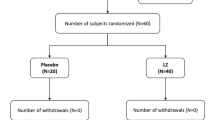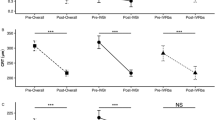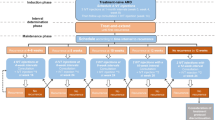Abstract
Purpose
To assess the positive effects of mindfulness-based stress reduction (MBSR) on the structural and functional outcomes of patients with central serous chorioretinopathy (CSCR).
Methods
This study included 60 patients with CSCR who were randomly allocated to one of two groups: MBSR or control (which did not practice MBSR). These groups were then evaluated in terms of best corrected visual acuity (BCVA) and central macular thickness (CMT) at months 1, 3, and 6.
Results
There were no significant differences in BCVA or mean CMT between the groups at the beginning of the study (p = 0.615 and p = 0.561, respectively). There were statistically significant differences between the groups in terms of BCVA at 1, 3, and 6 months (p = 0.018, p = 0.001, and p = 0.002, respectively). There were also significant differences in the mean CMT across the groups at the first, third, and sixth months (p < 0.001, p = 0.001, and p < 0.001, respectively).
Conclusion
MBSR may have beneficial outcomes in the early treatment of patients with CSCR, resulting in faster resolution of subretinal fluid and enhancement of BCVA.


Similar content being viewed by others
Data and material availability
Available upon a reasonable request.
Code availability
Not applicable.
References
Daruich A, Matet A, Dirani A, Bousquet E, Zhao M, Farman N et al (2015) Central serous chorioretinopathy: recent findings and new physiopathology hypothesis. Prog Retin Eye Res 48:82–118
Daruich A, Matet A, Marchionno L, De Azevedo J-D, Ambresin A, Mantel I et al (2017) Acute central serous chorioretinopathy: factors influencing episode duration. Retina 37:1905–1915
van Rijssen TJ, van Dijk EHC, Yzer S, Ohno-Matsui K, Keunen JEE, Schlingemann RO et al (2019) Central serous chorioretinopathy: towards an evidence-based treatment guideline. Prog Retin Eye Res 73:100770
Erikitola OC, Crosby-Nwaobi R, Lotery AJ, Sivaprasad S (2014) Photodynamic therapy for central serous chorioretinopathy. Eye (Lond) 28:944–957
Yadav NK, Jayadev C, Mohan A, Vijayan P, Battu R, Dabir S et al (2015) Subthreshold micropulse yellow laser (577 nm) in chronic central serous chorioretinopathy: Safety profile and treatment outcome. Eye 29:258–265
Pitcher JD 3rd, Witkin AJ, DeCroos FC, Ho AC (2015) A prospective pilot study of intravitreal aflibercept for the treatment of chronic central serous chorioretinopathy: the CONTAIN study. Br J Ophthalmol 99:848–852
Lotery A, Sivaprasad S, O’Connell A, Harris RA, Culliford L, Ellis L et al (2020) Eplerenone for chronic central serous chorioretinopathy in patients with active, previously untreated disease for more than 4 months (VICI): a randomised, double blind, placebo-controlled trial. Lancet 395:294–303
Chhablani J, Rani PK, Mathai A, Jalali S, Kozak I (2014) Navigated focal laser photocoagulation for central serous chorioretinopathy. Clin Ophthalmol 8:1543–1547
Singh SR, Goté JT, Chhablani J (2023) Randomized controlled trials in central serous chorioretinopathy: a review. Eye (Lond). https://doi.org/10.1038/s41433-023-02509-9
Conrad R, Geiser F, Kleiman A, Zur B, Karpawitz-Godt A (2014) Temperament and character personality profile and illness-related stress in central serous chorioretinopathy. Sci World J 2014:631687
Nongrem G, Surve A, Venkatesh P, Sagar R, Yadav RK, Chawla R, Vohra R, Kumar A (2021Dec) Effect of short-term meditation training in central serous chorioretinopathy. Indian J Ophthalmol 69(12):3559–3563
Yoshioka H, Katsume Y, Akune H (1982) Experimental central serous chorioretinopathy in monkey eyes: Fluorescein angiographic findings. Ophthalmologica 185:168–178
Kutz I, Borysenko JZ, Benson H (1985) Meditation and psychotherapy: a rationale for the integration of dynamic psychotherapy, the relaxation response, and mindfulness meditation. Am J Psychiatr. 142(1):1e8
Gagrani M, Faiq MA, Sidhu T, Dada R, Yadav RK, Sihota R et al (2018) Meditation enhances brain oxygenation, upregulates BDNF and improves quality of life in patients with primary open angle glaucoma: A randomized controlled trial. Restor Neurol Neurosci 36:741–753
Dada T, Mittal D, Mohanty K, Faiq MA, Bhat MA, Yadav RK et al (2018) Mindfulness meditation reduces intraocular pressure, lowers stress biomarkers and modulates gene expression in glaucoma: a randomized controlled trial. J Glaucoma 27:1061–1067
Dudani AI, Hussain N, Ramakrishnan M, Telang O, Patil VM, Dudani K, Jadhav B, Gholap V (2021) Psychiatric evaluation in patients with central serous chorioretinopathy in Asian Indians. Indian J Ophthalmol 69(5):1204–1207
Tekin K, Sekeroglu MA, Cankaya AB, Teke MY, Doguizi S, Yilmazbas P (2018) Intravitreal bevacizumab and ranibizumab in the treatment of acute central serous chorioretihopathy: a single center retrospective study. Semin Ophthalmol 33(2):265–270
Azam MA, Katz J, Fashler SR, Changoor T, Azargive S, Ritvo P (2015) Heart rate variability is enhanced in controls but not maladaptive perfectionists during briefmindfulness meditation following stress-induction: a stratified-randomized trial. Int J Psychophysiol Off J Int Organ Psychophysiol 98(1):27–34
Dada T, Ramesh P, Shakrawal J (2020) Meditation: a polypill for comprehensive management of glaucoma patients. J Glaucoma 29(2):133–140
Acknowledgements
None.
Funding
This research received no specific grants from any funding agency in the public, commercial, or not-for-profit sectors.
Author information
Authors and Affiliations
Contributions
Conception: DÖ, MK. Design of the work: DÖ, MK. Analysis: DÖ, MK. Interpretation of data: DÖ, MK. Writing and Review: DÖ, MK. Approved submitted version: DÖ, MK.
Corresponding author
Ethics declarations
Conflict of interest
The authors declare no conflicts of interest.
Ethical approval
This cross-sectional study adhered to the tenets of the Declaration of Helsinki and was approved by the ethics committee of a tertiary training and research hospital.
Consent to participate
All participants provided written informed consent to participate in the study.
Consent for publication
Study participants provided written informed consent for publication.
Additional information
Publisher's Note
Springer Nature remains neutral with regard to jurisdictional claims in published maps and institutional affiliations.
Rights and permissions
Springer Nature or its licensor (e.g. a society or other partner) holds exclusive rights to this article under a publishing agreement with the author(s) or other rightsholder(s); author self-archiving of the accepted manuscript version of this article is solely governed by the terms of such publishing agreement and applicable law.
About this article
Cite this article
Özcan, D., Karapapak, M. Effect of mindfulness-based stress reduction on acute central serous chorioretinopathy: a randomized control trial. Int Ophthalmol 44, 183 (2024). https://doi.org/10.1007/s10792-024-03102-z
Received:
Accepted:
Published:
DOI: https://doi.org/10.1007/s10792-024-03102-z




